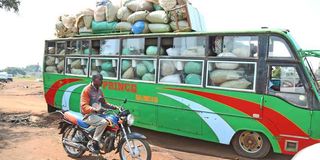How ‘broke’ city folk get food from villages

A bus leaves Kisumu for Nairobi on June 17. With biting economic times amid the Covid-19 pandemic, families in the rural areas have been forced to send foodstuffs to relatives in Mombasa and Nairobi. PHOTO | ONDARI OGEGA | NATION MEDIA GROUP
What you need to know:
- The coronavirus pandemic has left many families struggling to put a meal on the table.
In Siaya, a manager with one of the transport companies said they deliver cereals most of the time.
They charge Sh500 to ferry a 90kg-bag and between Sh350 and Sh400 for a bag weighing 50kg.
Every Sunday, 62-year-old Jenifer Oloo travels from her Yala home to Usenge beach in Bondo to purchase omena and fish, which she prepares, packs and sends to Nairobi.
For the last three months, she has become a regular customer of a local bus company plying the Nairobi route. The recipient of her package is her 27-year-old son, who is a mechanic in Kariobangi.
“I have the fish dried and then package it as a parcel, which I deliver through the bus company,” she tells the Nation.
Her son has been unable to fend for himself due to the effects of Covid-19, she says. He also can’t get out of Nairobi due to the lockdown announced by President Uhuru Kenyatta to contain the spread of the deadly disease.
“Jobs are hard to come by. My son says he hardly goes to work at the garage, where he has been eking out a living for the past two years,” Mrs Oloo said at her Yala home.
FAMILIES STRUGGLING
The coronavirus pandemic has left many families struggling to put a meal on the table.
For many city dwellers, with reduced and even no income at all following the lockdown imposed on Nairobi and Mombasa, they have been left at the mercy of their friends and relatives back in the villages.
From omena, smoked fish and dried meat to mushrooms, cereals, bananas, sweet and irish potatoes, relatives and friends have come in handy, ensuring a steady supply of food to city dwellers.
The Nation has established that, driven by demand, most PSV bus and shuttle companies moved to delivering cargo and parcels after the lockdown.
In Siaya, a manager with one of the transport companies said they deliver cereals most of the time.
In Vihiga, Mr Daniel Mugo, a transport agent at Mudete who receives the goods on behalf of bus companies, said this has been the main business for the firms since the travel ban.
Mr Mugo said most shuttle companies removed seats from their fleet and converted them into freight transporters after they got permits from the government to ferry consumables.
They charge Sh500 to ferry a 90kg-bag and between Sh350 and Sh400 for a bag weighing 50kg.
In Mumias, transport companies revealed that omena tops the list of foodstuff being sent to city dwellers.
MAIZE FLOUR
Mr Steve Orina, the branch manager, Easy Coach Bus Company, said bags of omena are registered at their office daily for transportation to Nairobi.
Each consignment is charged according to its weight.
“For a 10-kilogramme package, we charge roughly Sh600,” Mr Orina said.
Ms Rosemary Omina, whose two sons stay in Nairobi’s Huruma Estate, says she sends them two kilos of omena and about 40 kilos of maize flour every week.
She complained, however, of the high cost of transporting the goods and wants the government to intervene to reduce the charges.
In Kisumu, transport companies are charging between Sh400 to Sh1,200 for food deliveries, depending on the weight, size and type of commodity being transported.
FREE TRANSPORT
In Kakamega, an official at the Blueline offices told the Nation they were delivering packages containing cereals, sweet potatoes and indigenous vegetables to families in Nairobi. Dried mushrooms top the list.
In Kisii, most of those asking for food help from upcountry are those who have lost their jobs, yet can’t return home owing to travel restrictions. We found Ms Mary Obisa sending bananas to her siblings in Kitengela.
In South Mugirango, MP Silvanus Osoro provides free freight services to enable his constituents send food to their relatives.
Deliveries are made at the constituency offices in Nyamarambe every Friday. The MP said the arrangement will continue until the pandemic is over.
In Bomet and Kericho counties, residents are using trucks to dispatch food to their families in Nairobi and the coastal region.
A few of the families are also utilising courier services, including G4S and Wells Fargo.
By Dickens Wasonga, Wycliffe Nyaberi, Benson Amadala, Elizabeth Ojina, Derick Luvega, Vitalis Kimutai and Shaban Makokha





